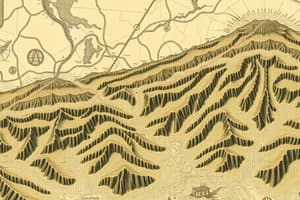Podcast
Questions and Answers
What is the purpose of a benchmark (BM) in surveying?
What is the purpose of a benchmark (BM) in surveying?
- To establish control points for additional measurements
- To mark physical locations on-site based on design plans
- To measure horizontal angles
- To serve as a permanent reference point with a known elevation (correct)
Which term describes the method of marking points along a linear project?
Which term describes the method of marking points along a linear project?
- Stationing (correct)
- Control Points
- As-Built Survey
- Cut and Fill
Which instrument combines a theodolite and distance measurement capabilities?
Which instrument combines a theodolite and distance measurement capabilities?
- Laser Level
- Auto Level
- Total Station (correct)
- EDM
What does triangulation in surveying involve?
What does triangulation in surveying involve?
What does the term 'cut and fill' refer to in construction surveying?
What does the term 'cut and fill' refer to in construction surveying?
Which of these describes what an as-built survey accomplishes?
Which of these describes what an as-built survey accomplishes?
What is the correct definition of resection in surveying?
What is the correct definition of resection in surveying?
What is the primary function of a GPS in surveying?
What is the primary function of a GPS in surveying?
Flashcards
Surveying
Surveying
The science of precisely measuring locations, distances, angles, and elevations on Earth's surface.
Benchmark (BM)
Benchmark (BM)
A permanent point with a known elevation, used as a reference for leveling.
Datum
Datum
A reference surface for horizontal or vertical measurements (e.g., sea level).
Control Points
Control Points
Signup and view all the flashcards
Traverse
Traverse
Signup and view all the flashcards
Stationing
Stationing
Signup and view all the flashcards
Stakeout
Stakeout
Signup and view all the flashcards
As-Built Survey
As-Built Survey
Signup and view all the flashcards
Study Notes
Surveying Terminology
- Surveying: The science of determining positions, distances, angles, and elevations on the Earth's surface.
- Benchmark (BM): A permanent reference point with a known elevation, used as a baseline for leveling.
- Datum: A reference surface used for horizontal or vertical measurements (e.g., mean sea level).
- Control Points: Surveyed points that serve as references for additional measurements or layout work.
- Traverse: A series of interconnected lines with measured angles and distances, used to establish control.
- Stationing: A method of marking and referencing points along a linear project, like a road or pipeline.
- Stakeout: The process of marking physical locations on-site based on design plans.
- As-Built Survey: A survey conducted after construction to ensure the project matches the design.
- Right-of-Way (ROW): A legally defined area where infrastructure can be built or accessed.
- Cut and Fill: Earthwork operations to lower high points (cut) or raise low points (fill) to meet design grades.
- Horizontal Alignment: The plan view layout of a project, showing the path's geometry.
- Vertical Alignment: The profile view of a project, showing elevations and slopes.
- Theodolite: An instrument for measuring horizontal and vertical angles.
- Total Station: Combines a theodolite and distance measurement to determine precise positions.
- Auto Level: A self-leveling instrument used for elevation measurements.
- Laser Level: A device projecting a laser beam to establish level or plumb lines.
GPS and EDM
- GPS (Global Positioning System): A satellite-based system for locating points with high precision.
- EDM (Electronic Distance Measurement): A device that measures distances electronically using light or sound waves.
Surveying Methods
- Leveling: Determining the relative heights of points on the Earth's surface.
- Triangulation: A surveying method that determines positions using angles and distances from known points.
- Resection: Locating an unknown point by measuring angles to three known points.
- Offset: A perpendicular distance from a baseline or survey line to a feature.
- Interpolation: Estimating unknown elevations or values between known points.
- Parallax: An apparent shift in an object's position caused by a change in the observer's viewpoint.
- Angle of Elevation: The angle between a horizontal line and a line of sight upward.
- Angle of Depression: The angle between a horizontal line and a line of sight downward.
Error Analysis
- Systematic Error: Consistent errors caused by flaws in equipment or methods.
- Random Error: Unpredictable errors due to environmental or observational factors.
Terrain Representation
- Contour Line: A line on a map connecting points of equal elevation, used to represent terrain.
- Prolongation: Extending a survey line beyond its original measured length.
Studying That Suits You
Use AI to generate personalized quizzes and flashcards to suit your learning preferences.




